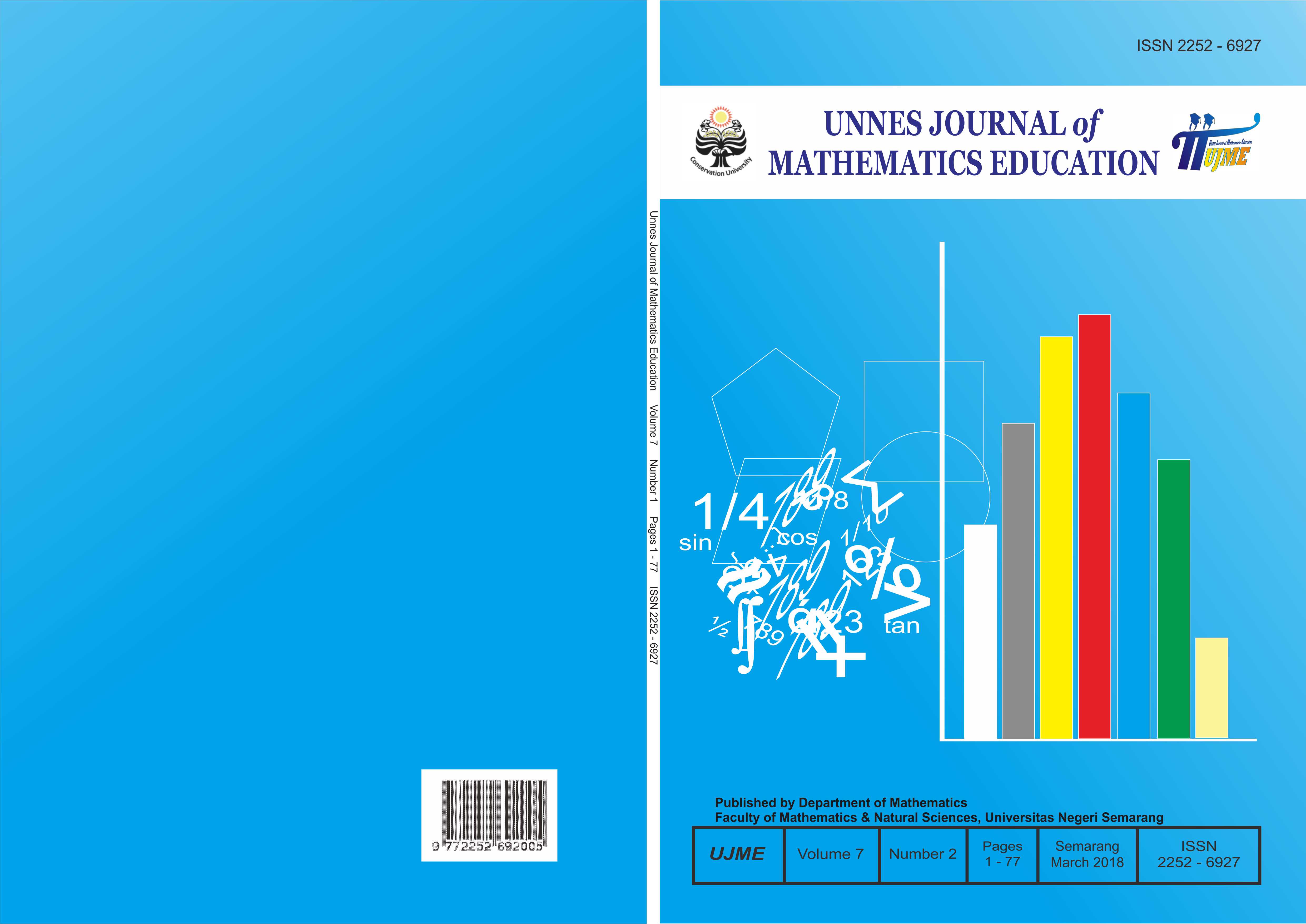The effectiveness of auditory intellectually repetition learning aided by questions box towards students’ mathematical reasoning ability grade XI SMA 2 Pati
##plugins.themes.academic_pro.article.main##
Abstract
The objective of this study is to determine does the AIR learning is effective towards students’ mathematical reasoning ability grade XI SMA 2 Pati on the sequence and the series material. The population in this study is all students grade XI SMA 2 Pati Academic Year 2016/2017. The method used in this study is quantitative method. While the data collection includes test methods, questionnaires, and observations. The results showed that: (1) the mathematical reasoning ability of students grade XI SMA 2 Pati who learn with AIR learning model is reaching the mastery learning; (2) the mathematical reasoning ability of students grade XI SMA 2 Pati who learn with AIR learning model aided by Questions Box is reaching the mastery learning; (3) the mathematical reasoning ability of students grade XI SMA 2 Pati who learn with AIR model aided by Questions Box is better than the mathematical reasoning ability of students who learn with AIR learning model and expository learning model; (4) the mathematical reasoning ability of students grade XI SMA 2 Pati who learn with AIR model aided by Questions Box is better than the mathematical reasoning ability of students who learn with AIR learning model and expository learning model for each group, either low, medium or high. Based on the four results of the above research, it can be concluded that the AIR learning aided by Questions Box is effective towards students’ mathematical reasoning ability grade XI SMA 2 Pati on the sequence and series material.
##plugins.themes.academic_pro.article.details##
References
Dave, M. (2002). The Accelerated Learning Handbook: Panduan Kreatif & Efektif Merancang Program Pendidikan dan Pelatihan. Diterjemahkan oleh Rahmani Astuti. Bandung: Kaifa PT. Mizan Pustaka.
Hudojo, H. (2005). Pengembangan Kurikulum dan Pembelajaran Matematika. Malang: Universitas Negeri Malang, 125-126.
Latifah, N. U. & Agoestanto, A. (2015). Keefektifan Model Pembelajaran AIR dengan Pendekatan RME terhadap Kemampuan Komunikasi Matematik Materi Geometri Kelas VII. Unnes Journal of Mathematics Educations, 4(1). Tersedia di http://journal.unnes.ac.id/sju/index.php/ujme [diakses pada 20-01-2017].
Lithner, J. (2000). Mathematical Reasoning in School Tasks. Educational Studies in Mathematics, 41(2), 165-190. Tersedia di http://www.jstor.org/stable/3483188 [diakses pada 28-01-2017].
Mueller, M. & Maher, C. (2009). Learning to Reason in an Informal Math After-School Program. Mathematics Education Research Journal, 21(3), 7-35 [diakses pada 03-01-2017].
O’Connell, J. (2008). Mathematics Study Guide. Sacramento: California Department of Education Press.
OECD. (2015). PISA 2012 Result in Focus-What 15-years-old know and what they can do with what they know. Programme for International Student Assessment.
Peraturan Menteri Pendidikan Nasional Republik Indonesia Nomor 22 tahun 2006 tentang Standar Isi Sekolah Menengah. 2006.
Rifa’i, A & Anni, C. T. (2011). Psikologi Pendidikan. Semarang: UPT Unnes Press.
Shadiq, F. (2004). Penalaran, Pemecahan Masalah dan Komunikasi Dalam Pembelajaran Matematika. Makalah disajikan pada Diklat Instruktur/ Pengembang Matematika SMP Jenjang Dasar Tanggal 10-23 Oktober 2004. PPPG Matematika. Yogyakarta [diakses pada 12-12-2016].
Slameto. (2010). Belajar dan Faktor-Faktor yang Mempengaruhinya. Jakarta: Rineka Cipta.
Suherman, E. (2003). Strategi Pembelajaran Matematika Kontemporer. Bandung: JICA.
Suyitno, H. (2014). Pengenalan Filsafat Matematika. Semarang: Universitas Negeri Semarang.
Syahlil, S. (2011). Question Box, Inovasi Media Pembelajaran di Sekolah. Laporan penelitian. Sidoarjo: SMK YPM 8 Sidoarjo.
Wardhani, S. (2010). Teknik Pengembangan Instrumen Hasil Belajar Matematika di SMP/MTs. Yogyakarta: PPPPTK Matematika.
